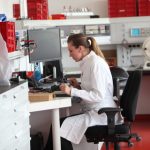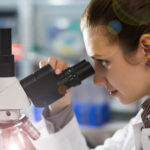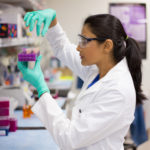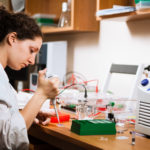
Bloodless revolution in diabetes monitoring
Scientists have created a non-invasive, adhesive patch, which promises the measurement of glucose levels through the skin without a finger prick blood test, potentially removing the need for millions of people with diabetes to frequently carry out the painful and unpopular tests. The University of Bath reports the patch does not pierce the skin, instead … Continue reading Bloodless revolution in diabetes monitoring

Biosensors for bladder cancer diagnosis
University of Bath scientists with the EU-funded BlaC E-assay project have proposed to develop biosensors, devices broadly used in biomedical applications to detect specific molecules present in biological samples. To detect the target molecule, biosensors employ bioreceptors such as antibodies, oligonucleotides or enzymes that generate a signal such as heat, light or pH change. Via … Continue reading Biosensors for bladder cancer diagnosis

Strenuous exercise doesn’t suppress the immune system
New research overturns a myth that has persisted for nearly four decades, that competing in endurance sports suppresses the body’s immune system and makes competitors more susceptible to infections. Research from the eighties, which focused on events such as the Los Angeles Marathon, asked competitors if they had symptoms of infections in the days and … Continue reading Strenuous exercise doesn’t suppress the immune system

Clues to how new cell types could evolve
Developmental biologists at the University of Bath have gained insights into how a family of essential genes interact differently between different parts of the body and between species, which could offer clues about how new types of cells come to evolve. The University of Bath reports researchers from its Department of Biology & Biochemistry, working … Continue reading Clues to how new cell types could evolve

University of Bath drug discovery deal with Sapience
The University of Bath and Dr Jody Mason from its Department of Biology & Biochemistry have entered into a research collaboration agreement with biotechnology company Sapience Therapeutics Inc to discover new therapeutic agents for cancers. Sapience is focused on discovering and developing peptide therapeutics to address difficult to treat cancers. Dr Barry Kappel, founder and … Continue reading University of Bath drug discovery deal with Sapience

Complicated inhalers prevent people taking medicine
People who have respiratory disease and arthritis could struggle to manage their conditions because their inhalers are too fiddly for them to use. The University of Bath reports NHS staff should check that people with respiratory diseases and rheumatoid arthritis can use their inhalers properly to reduce the risk of them being unable to take … Continue reading Complicated inhalers prevent people taking medicine

ALS-linked protein’s journey more complex than thought
University of Bath scientists have developed a better understanding of a key protein associated with brain diseases including ALS (motor neurone disease) and dementia by studying how it enters central nervous system cells. The University of Bath reports researchers from its Department of Biology & Biochemistry studied how angiogenin, a protein which crosses into cells … Continue reading ALS-linked protein’s journey more complex than thought

Study to help people exercise and lose weight
The University of Bath are carrying out a study using a personalised diet and exercise programme to reverse the effects of weight gain and a sedentary lifestyle. The researchers can use this as a model to look at factors which may make some people more likely to develop type 2 diabetes. The University of Bath … Continue reading Study to help people exercise and lose weight

Fellowship awarded for stroke prevention research
The Dunhill Medical Trust has awarded University of Bath PhD student Anneka Mitchell a research training fellowship of £182,000 to investigate the safety and effectiveness of directly acting oral anticoagulants (DOACs). Warfarin had been the mainstay of treatment for stroke prevention in patients with atrial fibrillation until the first DOACs were introduced, in 2009. The … Continue reading Fellowship awarded for stroke prevention research

A small piece of paper can make water consumption safer
A revolutionary microbial-based paper sensor has been developed by researchers at the University of Bath, creating a cheap, sustainable and recyclable device for detecting toxic compounds in water. Access to safe drinking water is one of the UN’s Sustainable Development Goals, since it is a basic human right and is crucial to combating inequalities and … Continue reading A small piece of paper can make water consumption safer








